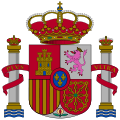- General Council of the Judiciary
-
Spain 
This article is part of the series:
Politics and government of
SpainLegislature- Cortes Generales
- Congress of Deputies
- President
- Senate
- President
- Congress of Deputies
- Opposition Leader
- People's Defender
- Court of Accounts
- General Council of the Judiciary
- Supreme Court
- Audiencia Nacional
Divisions- Autonomous
communities- Reg. governments
- Reg. legislatures
- Provinces
- Comarcas
- Municipalities
Foreign policy
The General Council of the Judiciary (Spanish: Consejo General del Poder Judicial, CGPJ) is the constitutional body that governs all the Judiciary of Spain, such as courts, and judges, as it is established by the Spanish Constitution of 1978, article 122 and developed by the Organic Law 6/1985 of the Judiciary Power (LOPJ). The President of the CGJP is also the president of the Supreme Court
Contents
Functions
The GCJP is not a jurisdictional body, but an overseeing and organising body of the Spanish Judiciary. Among its main functions are:
- To elect, among its members, its president and president of the Supreme Court
- To nominate, by a three fifths supermajority two justices of the Constitutional Court
- To oversee and inspect the activities of judges and courts.
- To select, train, assign destination, administrative situations and establish and keep the disciplinary rules and procedures of judges and magistrates.
- To name judges and with the assessment of the Minister of Justice, the Magistrates of the Supreme Court, Court presidents and magistrates.[1]
The GCJP is also compelled to report on all the laws and legal dispositions of the State and the Automous Communities pertaining judiciary questions. As well as to be heard upon the naming of the Attorney General of the Sate.[2]
Composition
The GCJP is made up of 20 members, named for a period of five years, that can not be renovated, by the King on the assessement of the Minister of Justice, after being nominated by both houses of the Cortes Generales.
Its members are:
- Twelve members who are active Judges and Magistrates, of which the Congress of Deputies names six and the Senate the other six in any case by a three fifths supermajority. This members are drafted out of a list of 36 judges and magistrates proposed by the professional associations of judges and magistrates, that represent al least two percent of the active judges and magistrates, and by independent judges that obtain at least the endorsement of at least two percent of the active judges and magistrates.
- Eight Lawyers or other jurists with more than fifteen years of active service, four on proposal of the Congress of Deputies and another four on proposal of the Senate, in any case by a three fifths supermajority.
See also
- Spanish Judiciary
- Constitutional Court of Spain
- Supreme Court of Spain
External links
References
Categories:- Government of Spain
- Spanish law
- Spanish organisation stubs
- Cortes Generales
Wikimedia Foundation. 2010.

